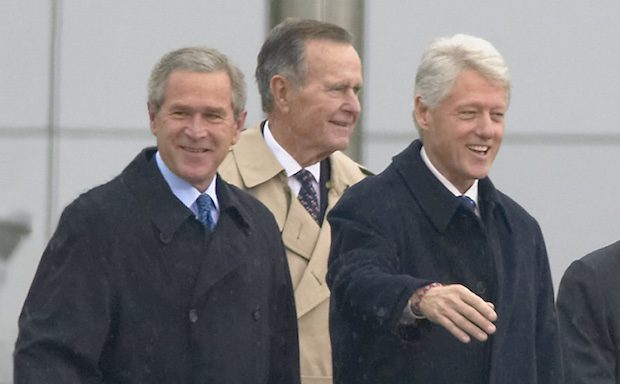After Neoliberalism

This year is shaping up to be the most unconventional moment in American politics in a generation. A race that mere months ago seemed to promise yet another Bush vs. another Clinton has so far given us instead the populist insurgencies of Bernie Sanders and Donald Trump. Whether or not either of them gets his party’s nomination, the neoliberal consensus of the past two decades seems about to shatter. Free trade, immigration, waging war for democracy, and even the relative merits of capitalism and “democratic socialism” have all come into question. Perhaps more fundamentally, so has the right of Clintons and Bushes—and those like them—to rule.
Trump is a billionaire, but his base of support rests among the people once identified by the sociologist Donald Warren as “middle American radicals.” Nearly 40 years ago, Warren’s idea was adapted by the hard-right political thinker Sam Francis as the basis for paleoconservatism—a conservatism very unlike that of the postwar conservative movement, one that would champion the class interests and cultural attitudes of middle- and lower-income whites. The Pat Buchanan presidential campaigns of 1992 and 1996 put Francis’s ideas to the test. They fell short of propelling Buchanan to the GOP nomination, and by the end of the 1990s there was nary a trace of paleo ideology to be found among conservatives or Republicans. The return of the Bush family to power in 2000 seemed to confirm that nothing had changed after a decade of skirmishes.
Now suddenly there’s Trump. And on the left, there’s Sanders, a throwback to a time when progressives embraced the socialist label. That had fallen out of fashion even before the end of the Cold War—indeed, the Democratic Leadership Council, the policy group that paved the way for Bill Clinton’s nomination, was founded in 1985 precisely to move the Democratic Party toward “market-based solutions.”
That economic populism should find a foothold in both parties after the Great Recession and eight years of lagging prosperity under Barack Obama is not entirely surprising. What is more remarkable is the weakness of the bipartisan establishment, whose conventional wisdom is no longer meekly accepted by the rank and file of either party. Every Republican except Trump has tried, to one degree or another, to present himself as a champion of conservative orthodoxy. But that orthodoxy no longer commands the loyalty of a sufficient number of voters to preclude a phenomenon like Trump. Nor does DLC-style neoliberalism appear to be the consensus among Democrats any longer.
A void is opening in American politics, and Trump and Sanders are only the first to try to fill it. Neither of them may succeed. Yet it is hard to see any source of renewal for the crumbling establishment they are fighting to replace. Just as the end of the Cold War marked the passing of an era, and partially or wholly transformed the left and right alike, so another era is drawing to a close now, with further political mutations to come. Trump and Sanders need not be the future, but what Bush and Clinton represent is already past—no matter who wins in November.
Conservatives of Burkean temperament view all of this warily. There is an opportunity here to replace stale ideologies with a prudence that is ultimately more principled than any mere formula can be. But there is also the risk that the devil we know is only making way for another we don’t. At times like these, it is important to know what to conserve, which is not a label or ideology, but a healthy and humane republic.
Comments